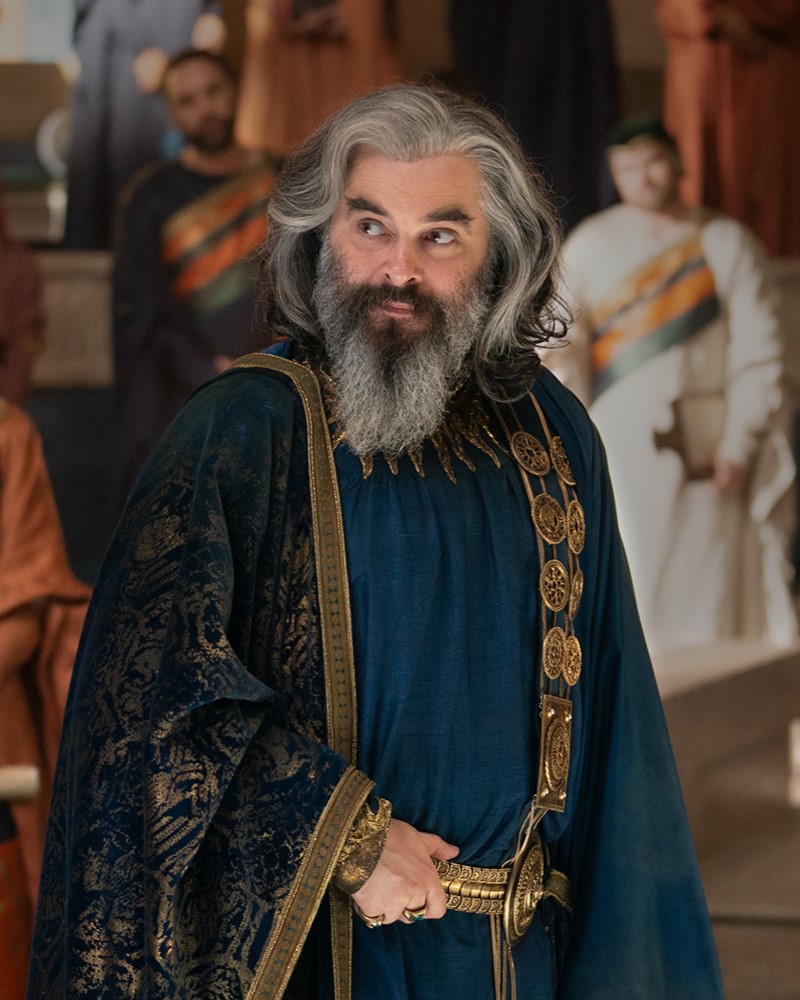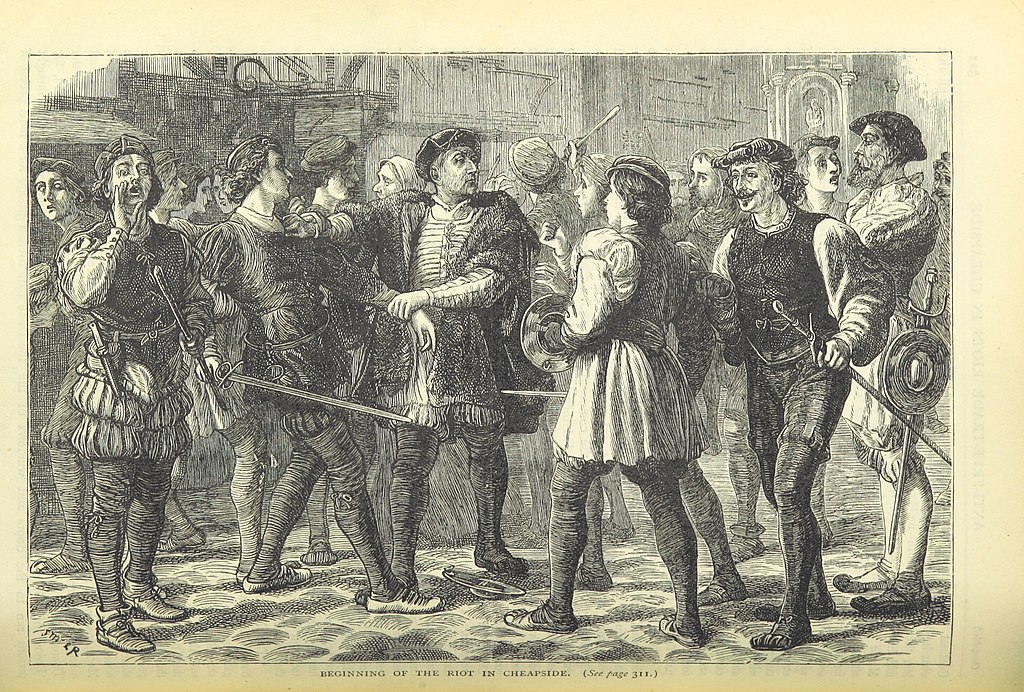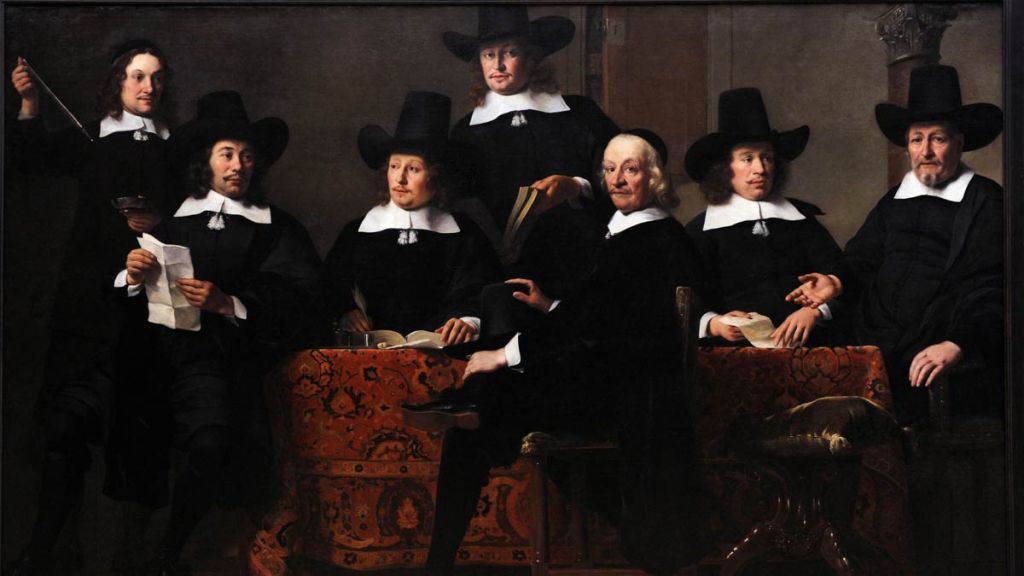Of Guilty Guilds: Addressing Anti-Immigration Populism in The Rings of Power, Episode 4
As per my Episode 4 review of The Rings of Power, I noted that the Men of Númenor objecting to Elves on a “they’ll steal our jobs!” basis feels a tad weird. Of all the things these people have to throw at their pointy-eared brethren, the show settles upon that? It is not merely profoundly petty, considering the wider cosmic themes of Death and Mortality at work in the source material, but also carries with it a whiff of on-the-nose contemporary commentary. Recall that the real reason Tolkien’s Númenoreans fall out with the Elves is over envy at immortality. Jobs never come into it.

Now, for me, this is not a deal-breaker. Pharazôn – who both dampens down the crowd and harnesses it for public relations purposes – is posing as a Man of the People. The guy is weighed down with Guild badges like Leonid Brezhnev with self-awarded medals, and is interested primarily in maintaining excellent political relationships with the people of the island. Given his populist political tendencies, the addition of certain sinister overtones is not completely outlandish. It’s not exactly Tolkien, but I’m prepared to live with it.
However, certain other commentators are not prepared to live with it, asserting that this is the show imposing modern politics on Tolkien. Now, such people do have a case. Immersion matters in art – if it is broken, that is the fault of the creator. However, this might also be a Mountebank and the Farmer situation from Aesop’s Fables, whereby the audience incorrectly thinks the real thing is a fake. Or as TV Tropes calls it, Reality is Unrealistic.
You see, tempting though it is to imagine that pre-moderns had other concerns, to think “they’re stealing our jobs!” is purely modern politics is to ignore history. Indeed, stirring up the rabble over “immigrants stealing jobs” is a time-honoured tradition. In 1517, the so-called Evil May Day resulted in anti-foreigner riots in London.
https://en.wikipedia.org/wiki/Evil_May_Day
The phenomenon even shows up in English Elizabethan Drama, with Sir Thomas More (the play of 1591-1593, not the person) explicitly featuring it – the scene where More tries to reason with the crowd is
now often thought to be the work of William Shakespeare himself. In an uglier variant, Robert Wilson’s xenophobic Pedlar’s Prophecy (1595) actively runs with the notion that Migrants are the Problem. So such
rhetoric is not simply the domain of twentieth and twenty-first century societies, nor even democratic ones. This stuff is as old as it is ugly.

But putting it in Tolkien is still a bit weird, right? I mean, Tolkien deals with myth, not in economics or politics. Well, in that case I would suggest the show is guilty of trying to ground Tolkien’s worldbuilding in reality.
You see, Tolkien likes having Guilds in his world. Aldarion’s Guild of Venturers might be the most famous one, closely followed by the Gwaith-i-Mirdain of Eregion. More obscure – but arguably more relevant
for the present discussion – is the Guild of Weaponsmiths in Númenor (Unfinished Tales, p.219.). And what Tolkien’s Guilds all have in common is that they are communities of like-minded individuals, devoted to preserving or expanding knowledge. Less charitably in the case of Aldarion, his Guild is just a club for rich boys who like to muck around with ships.
Tolkien the academic is interested in these institutions preserving and expanding knowledge. What he does not consider is the economic implications of the Guild system. Because in historical reality, the purpose of Guilds was to strictly regulate economic activity in a given location – the regulation in question being tantamount to a price-fixing Cartel. The Guilds kept their membership exclusive and their prices high, and jealously maintained their monopolistic privileges. Heaven help you if you wanted to work as a smith in a given city without Guild approval. That sort of economic competition could not be allowed.
(While the Guilds themselves are gone today, or at least have been de-fanged, their legacy still survives in various odd little legal quirks, like council by-laws).
So while Tolkien probably did not imagine the Gwaith-i-Mirdain turning up on some innocent Elf’s doorstep and demanding that they stop making jewellery for their neighbour “or else”, that is actually what the situation implies. In theory. Cue fanfiction about Celebrimbor running his Guild like a Mafia boss.
It is also what The Rings of Power itself runs with, at least in the case of Númenor. In Episode 3, we have Halbrand being told that he cannot work as a smith without Guild membership, and Eärien’s entry into the Builders’ Guild is seen as a big deal. Pharazôn’s collection of Guild badges testifies to his ability to curry favour with political interest groups, all of whom are interested in one thing – preserving their economic power.
Well and good. Now put yourself in the shoes of one of these Guildsmen. You have a comfortable, protected livelihood. Your customers pay premium rates for your products, but then you pay premium rates for everyone else’s products too. You have your well-established place in the economic hierarchy, and your Guild-Master is one of Chancellor Pharazôn’s drinking-buddies. Your son will follow in your footsteps, and you know that he too will enjoy a comfortable, protected livelihood.

Now suppose that you learn of a new arrival in town – an arrival who turns up with an Elf, no less. You hear this arrival has tried to steal someone else’s Guild-badge – a direct economic threat to everyone associated with Guilds. Why, who knows what mediocre work an unlicensed smith might turn out, quite apart from the likelihood that he will be undercutting Guild prices too – if he’s low-quality (of course he’s low-quality. He’s not Númenorean!), he’ll want to sell-off his stuff cheaper than the fixed price to ensure he gets customers. He must be stopped, clearly. And that Elf associated with him… why that makes it worse. Imagine if the Elves started filling the key crafting roles, or start infiltrating your Guild. No chance now of advancement – those bastards live forever!
So given the in-universe situation, the Guildsman’s Quendiphobic rhetoric actually makes self-interested sense, albeit he ought to be going after Halbrand more than Galadriel. Is the scene remotely based in Tolkien’s own work and thought-processes? No. But Tolkien was not interested in economics, and he gives zero thought to how his Númenorean Guild of Weaponsmiths would actually behave in practice. The show is actually making a stab at this, and in the process trying to inject allusions to Elven immortality being an issue for Númenoreans. Is the result a bit on the nose, given modern political debates? Yes, I think one can make that case – and the immersion argument is a fair one. But the show is not being stupid about this, given the worldbuilding details Tolkien left them to work with.
Alas, in this case I think The Rings of Power might have been too clever for its own good.

Pingback: An Idle Ode to Adar the Elda: A Review and Analysis of The Rings of Power, Episode 4 | A Phuulish Fellow
“Less charitably in the case of Aldarion, his Guild is just a club for rich boys who like to muck around with ships.”
Hey, don’t insult my man Ulbar :), he’s a common shephard from Emerie serving those uptight lords like Hallatan :)! Jokes aside, Guild of Venturers seems to admit not only the lords but commoners as well, anyone who was willing to become ‘brave adventurer’ 🙂 (just like Tower Guard in Gondor Third Age seems to admit anyone worthy enough, Beregond was no lord nor captain, but simple man at arms). To me focusing on this weird aspect that is not even present in the any sort of texts, hell those guilds, aside from Venturers that have much more important role overall, are basically background, the details of worldbuilding but making it a plot point could have been done with with all the stuff that Saur….Halbrand badge stealing was and that would be enough 🙂 or at least if they really wanted to carry on this thing, do something more substantial with it instead of something so lazy.
Economics in Tolkien play a part in giving various background to the events, similarly the case with mithril mining, obviously in lore the discovery of this precious metal is important as it leads in logical cause and effect chain of events, to establishment of Eregion and both sides Dwarves and Elves are ecstatic to trade it, Elves devise ithildin, they make the West-door of Moria together. In a way this ‘economical’ aspect leads to discussion about something far more important, similarly The Hobbit, the economics of dwarves of Lonely Mountains played a part in background info, they gathered huge treasure that attracted dragons etc. And that’s it Tolkien knows to not overuse it, not to meander into some weird take of social commentary that is really clumsily done. The show also seems to forget the Numenoreans are not supposed to be so….mundane. Dunedain were stronger, more durable men, easily on par with elven physical abilities. To Tolkien it was important to note that Numenoreans became so much alike elves and yet still not nearly enough for their liking hence the resentment of their mortal condition, they were given all those gifts…and it still wasn’t enough for them, it talks about the human condition.
Seriously I’m more and more reminded of that Zimmerman’s script :). Tolkien letter about the film treatment of Lotr:
“If Z and/or others do so, they may be irritated or aggrieved by the tone of many of my criticisms. If so, I am sorry (though not surprised). But I would ask them to make an effort of imagination sufficient to understand the irritation (and on occasion the resentment) of an author, who finds, increasingly as he proceeds, his work treated as it would seem carelessly in general, in places recklessly, and with no evident signs of any appreciation of what it
is all about. ….
The canons of narrative art in any medium cannot be wholly different; and the failure of poor films is often precisely in exaggeration, and in the intrusion of unwarranted matter owing to
not perceiving where the core of the original lies.”
Why they used THAT of all things to build up a scene? Why not explore more the ‘political/ideological’ division of the island population, the Faithful and King’s Men, why the appearance of an elf could have rather been used as pretext for King’s Men to incite violence against the Faihtful the elf-friends, making them accuse them of being traitors, attempt at some plot or intrigue that they facilitated the appearance of an elf, denying the very laws of Numenor prohibiting their presence, this could have sparked a riot, the use of scapegoats etc.
LikeLiked by 1 person
I was being facetious, of course, with my rich boys comment… albeit I think there is a grain of truth to it. Funding the building of such sea-going ships would have been a highly expensive endeavour, a luxury for Numenorean society, and one that is getting bankrolled by Aldarion and like-minded lords. And unlike real-life exploration, which was rooted in finding prospective trade or resources… the Numenorean exploration is about doing things because they can. At least prior to the great imperial looting of Middle-earth anyway. So the Guild of Venturers really would have been a vast financial drain on the island… at least for a while. And all for a glorified hobby – sure, they have lower-class labour too, but they need someone to do the mundane jobs on the ships.
So far as That Scene goes, I think they are beefing up the Guilds as a means of foreshadowing Pharazon’s seizure of power. He’s not a military general here, so they have given him another internal path to power, one where he relies on the support of economic interest groups.
LikeLike
Considering that the king himself Tar-Meneldur was not keen on the Venturers in various points, at some moments even forbidding them resources like timber for shipbuilding, then I would say it’s mostly done the funding that is by Aldarion, who after all is given official titles, as Lord of the Ships and Havens of Númenor; as well by what they themselves can provide as organization in communal effort, the guild is obviously more about exploring…but Meneldur also mentions curious thing once:
“”Rather would I have had you beside me, than any news or gifts from the Dark Lands. This is the part of merchants and explorers, not of the King’s Heir. What need have we of more silver and gold, unless to use in pride where other things would serve as well? The need of the King’s house is for a man who knows and loves this land and people, which he will rule.”
So there is talk of merchants etc. and they already were bringing riches to the isle, Aldarion himself brought:
“Seven years passed before Aldarion came back, bringing with him ore of silver and gold; and he spoke with his father of his voyage and his deeds.”
And they made contacts not onyl with elves receivign many rich gifts but also other peoples of Middle-earth and there would be no doubt tangible benefits coming from the activities. Besides before there was a guild, the Numenor already had many mariner and sailors, fishers, and some private endevaours like Veantur.
In general since it’s conception the guild was rather thriving despite difficulties
“Therefore he formed the Guild of Venturers, that afterwards was renowned; to that brotherhood were joined all the hardiest and most eager mariners, and young men sought admission to it even from the inland regions of Númenor, and Aldarion they called the Great Captain. At that time he, having no mind to live upon land in Armenelos, had a ship built that should serve as his dwelling-place; he named it therefore Eämbar, and at times he would sail in it from haven to haven of Númenor, but for the most part it lay at anchor off Tol Uinen: and that was a little isle in the bay of Rómenna that was set there by Uinen the Lady of the Seas. 7 Upon Eämbar was the Guildhouse of the Venturers, and there were kept the records of their great voyages; 8 for Tar-Meneldur looked coldly on the enterprises of his son, and cared not to hear the tale of his journeys, believing that he sowed the seeds of restlessness and the desire of other lands to hold.
In that time Aldarion became estranged from his father, and ceased to speak openly of his designs and his desires; but Almarian the Queen supported her son in all that he did, and Meneldur perforce let matters go as they must. For the Venturers grew in numbers and in the esteem of men, and they called them Uinendili, the lovers of Uinen; and their Captain became the less easy to rebuke or restrain. The ships of the Númenóreans became ever larger and of greater draught in those days, until they could make far voyages, carrying many men and great cargoes; and Aldarion was often long gone from Númenor. Tar-Meneldur ever opposed his son, and he set a curb on the felling of trees in Númenor for the building of vessels; and it came therefore into Aldarion’s mind that he would find timber in Middle-earth, and seek there for a haven for the repair of his ships. In his voyages down the coasts he looked with wonder on the great forests; and at the mouth of the river that the Númenóreans called Gwathir, River of Shadow, he established Vinyalondë, the New Haven. 9
But when nigh on eight hundred years had passed since the beginning of the Second Age, Tar-Meneldur commanded his son to remain now in Númenor and to cease for a time his eastward voyaging; for he desired to proclaim Aldarion the King’s Heir, as had been done at that age of the Heir by the Kings before him.”
The economic aspect at grabbing power would have worked way better if it was directly playing into Numenoran colonialism and imperial policies,…which are HUGE element of Second Age. It would even narratively serve better.
“In the second stage, the days of Pride and Glory and grudging of the Ban, they begin to seek wealth rather than bliss. The desire to escape death produced a cult of the dead, and they lavished wealth on tombs and memorials.They now made settlements on the west-shores, but these became rather strongholds and ‘factories’ of lords seeking wealth, and the Númenóreans became tax-gatherers carrying off over the sea evermore and more goods in their great ships. The Númenóreans began the forging of arms and engines…”
One leads into the other, and anyway, Pharazon even in appendices is a military leader, he will have to one day venture out into Middle-earth as commander, unless we will get a giant retcon :). Who landed at Umbar with an army, why Ar-Pharazon.
LikeLike